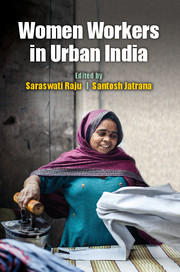Book contents
- Frontmatter
- Contents
- List of Figures
- List of Tables
- Preface
- 1 Setting the Backdrop
- 2 Women Workers in Urban India and the Cities
- 3 Gendered Vulnerabilities: Work-Life Trajectories of Female Domestic Workers in Jaipur
- 4 Occupational Domestication in a Post-Resettlement Context: An Analysis of Women's Work in Kannagi Nagar, Chennai
- 5 Old Jobs in New Forms: Women's Experiences in the Housekeeping Sector in Pune
- 6 Persistent Inequalities and Deepened Burden of Work? An Analysis of Women's Employment in Delhi
- 7 Spare Change for Spare Time? Homeworking Women in Banaras
- 8 Gender, Work and Space: Home-based Workers in Garment Industry in Kolkata
- 9 Labour Control and Responses: Women Workers in an Apparel Park in Kerala
- 10 New Urban Economic Spaces and the Gendered World of Work in Kolkata
- 11 Gender Equality and Women's Employment in the Banking Sector in India
- 12 Women Body Screeners and the Securitization of Space in Indian Cities
- Notes on Contributors
- Index
3 - Gendered Vulnerabilities: Work-Life Trajectories of Female Domestic Workers in Jaipur
Published online by Cambridge University Press: 05 May 2016
- Frontmatter
- Contents
- List of Figures
- List of Tables
- Preface
- 1 Setting the Backdrop
- 2 Women Workers in Urban India and the Cities
- 3 Gendered Vulnerabilities: Work-Life Trajectories of Female Domestic Workers in Jaipur
- 4 Occupational Domestication in a Post-Resettlement Context: An Analysis of Women's Work in Kannagi Nagar, Chennai
- 5 Old Jobs in New Forms: Women's Experiences in the Housekeeping Sector in Pune
- 6 Persistent Inequalities and Deepened Burden of Work? An Analysis of Women's Employment in Delhi
- 7 Spare Change for Spare Time? Homeworking Women in Banaras
- 8 Gender, Work and Space: Home-based Workers in Garment Industry in Kolkata
- 9 Labour Control and Responses: Women Workers in an Apparel Park in Kerala
- 10 New Urban Economic Spaces and the Gendered World of Work in Kolkata
- 11 Gender Equality and Women's Employment in the Banking Sector in India
- 12 Women Body Screeners and the Securitization of Space in Indian Cities
- Notes on Contributors
- Index
Summary
Introduction
Of late, the gains and pains of paid domestic work have received much scholarly attention. Most studies are, however, located in a transnational context, exploring paid domestic work performed by migrant workers from poorer countries in wealthier countries in East Asia (Constable 1997; Lan 2003; Keezhangatte 2004; Dannecker 2005; Cheng 2006), Europe (Anderson 2000; Chang 2006; Näre 2010) and North America (Bakan and Stasiulis 1995; Hondagneu-Sotelo 2001; Parreñas 2006; Romero 2002; Chang 2006). While the structures within which domestic labour relations are established differ significantly in terms of legislation, welfare systems and gendered divisions of labour, the literature shows striking similarities in practices and attitudes towards workers across the board.
Paid domestic work is part of the societal reproduction system (Romero 2002). Households are fundamental units of social organization and domestic activities and relations have great political and economic significance, and are inseparable from the relationships and processes that make up the ‘public domain’ (Hendon 1996, 47–48). In India, paid domestic work has witnessed phenomenal growth in recent years, particularly in urban India; it is essential and Qayum 2009) and their gender dynamics (Mattila 2011). A very large number of Indians are directly or indirectly involved in paid domestic work — as members of an employing household, as workers, or as family members of a domestic worker. While previous studies on India have provided rich analyses on how paid domestic work is organized on class, gender, and caste lines, age and life stages as governing tools in the market and their influence on employer preferences have received little attention.
Based on an ethnographically oriented study among local and migrant domestic workers from different ages in Jaipur, Rajasthan, this chapter places female domestic workers and their life courses and vulnerabilities within the framework of socio-cultural norms related to gender. These norms in turn lay a range of expectations, limitations and opportunities to working women and girls and heavily shape their employment trajectories. It is argued that in order to understand the meaning of paid employment in the urban female workers’ lives, one must explore their life course as daughters, wives and mothers, since understanding the parameters set by these roles are necessary for understanding their labour market decisions.
- Type
- Chapter
- Information
- Women Workers in Urban India , pp. 67 - 96Publisher: Cambridge University PressPrint publication year: 2016
- 1
- Cited by



